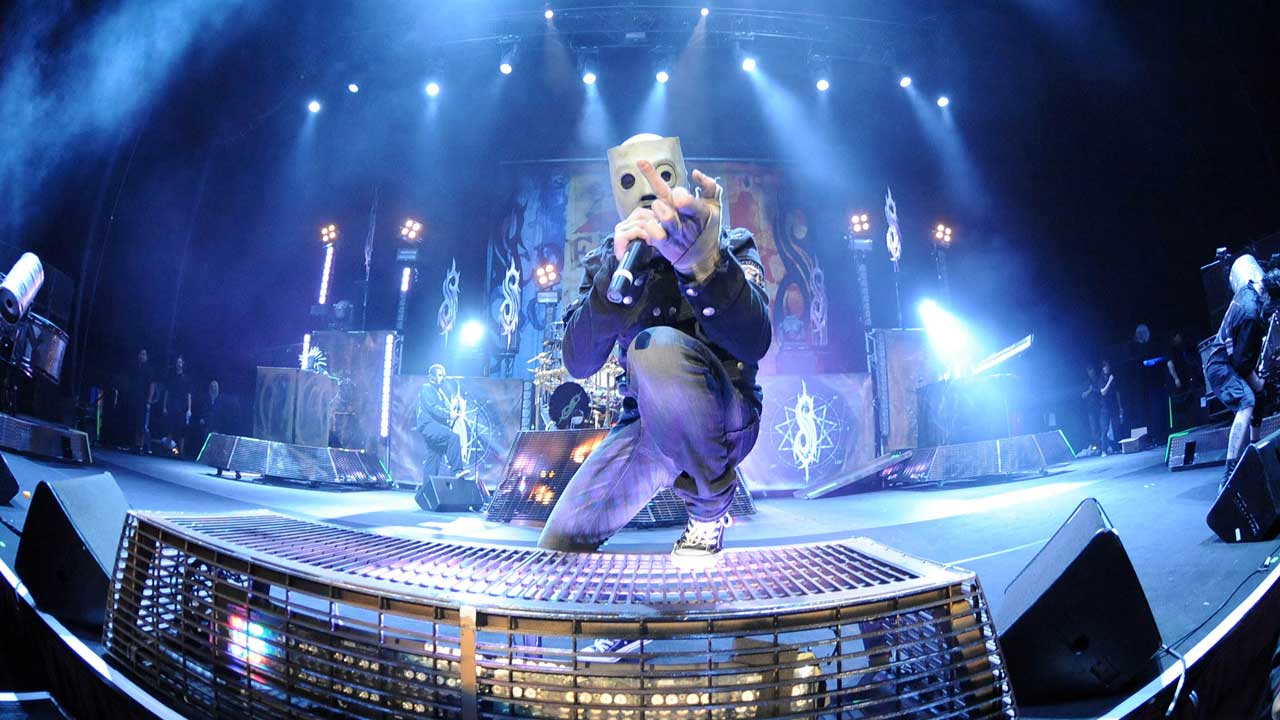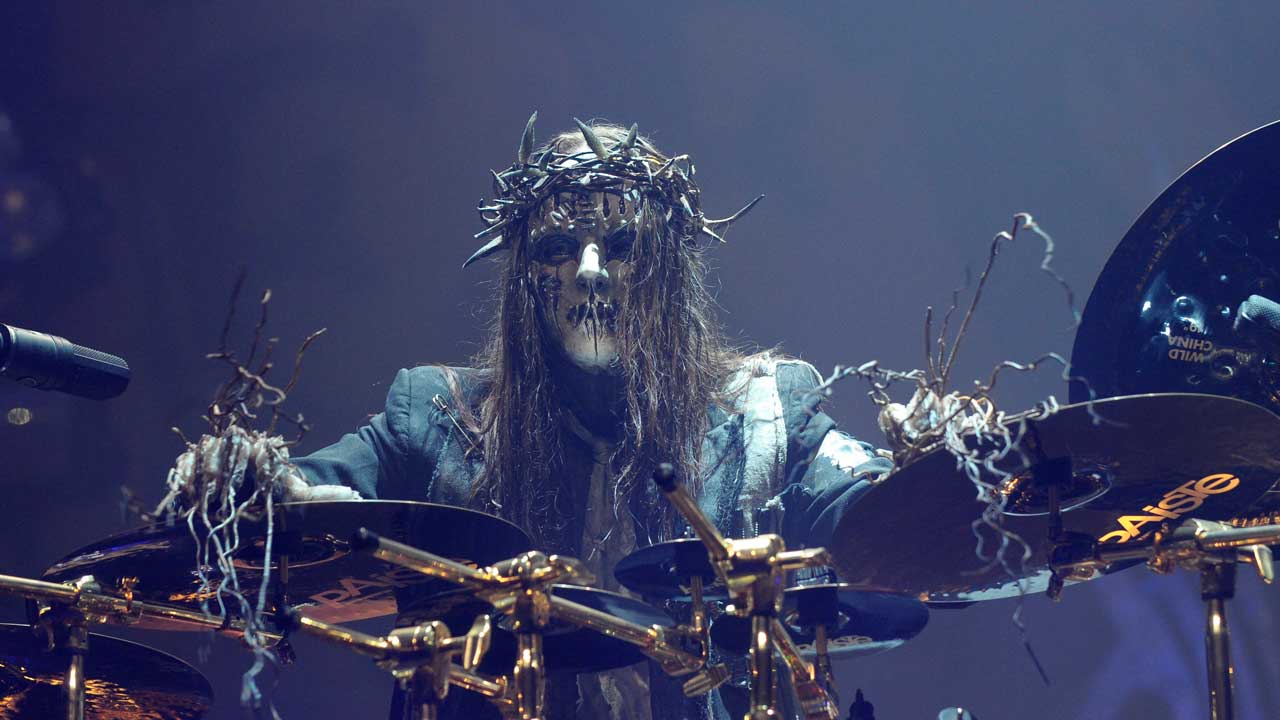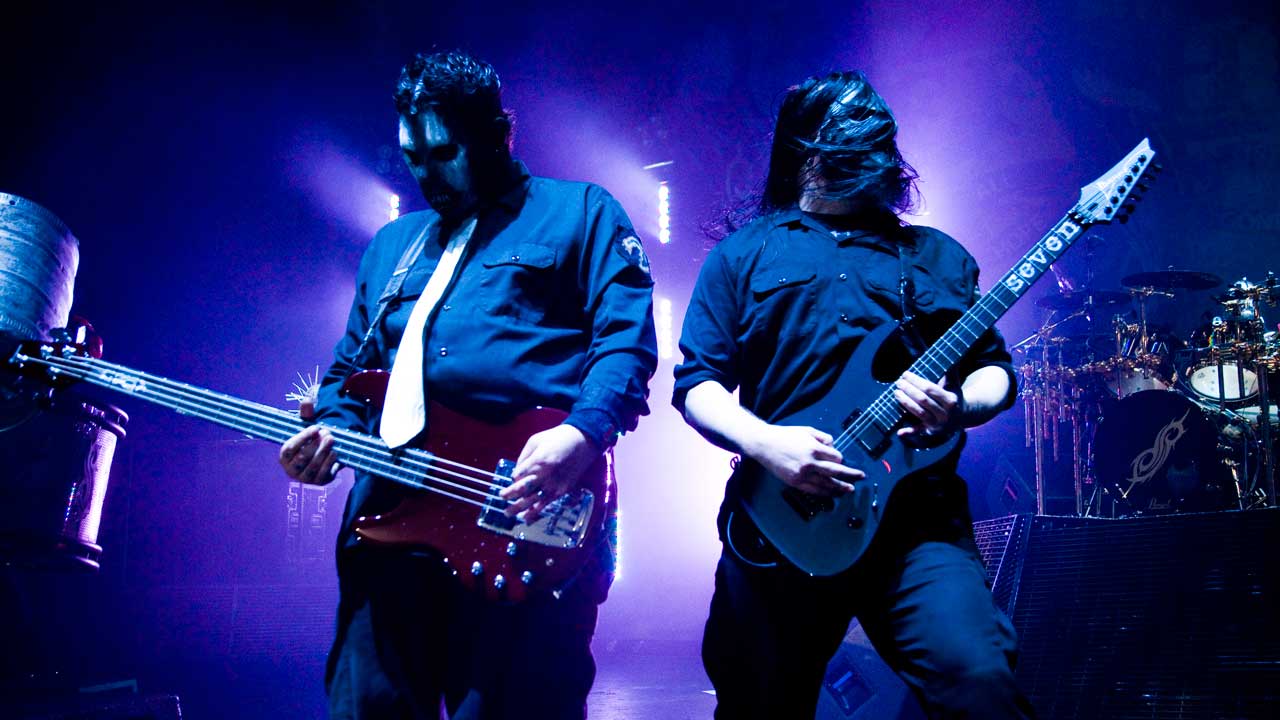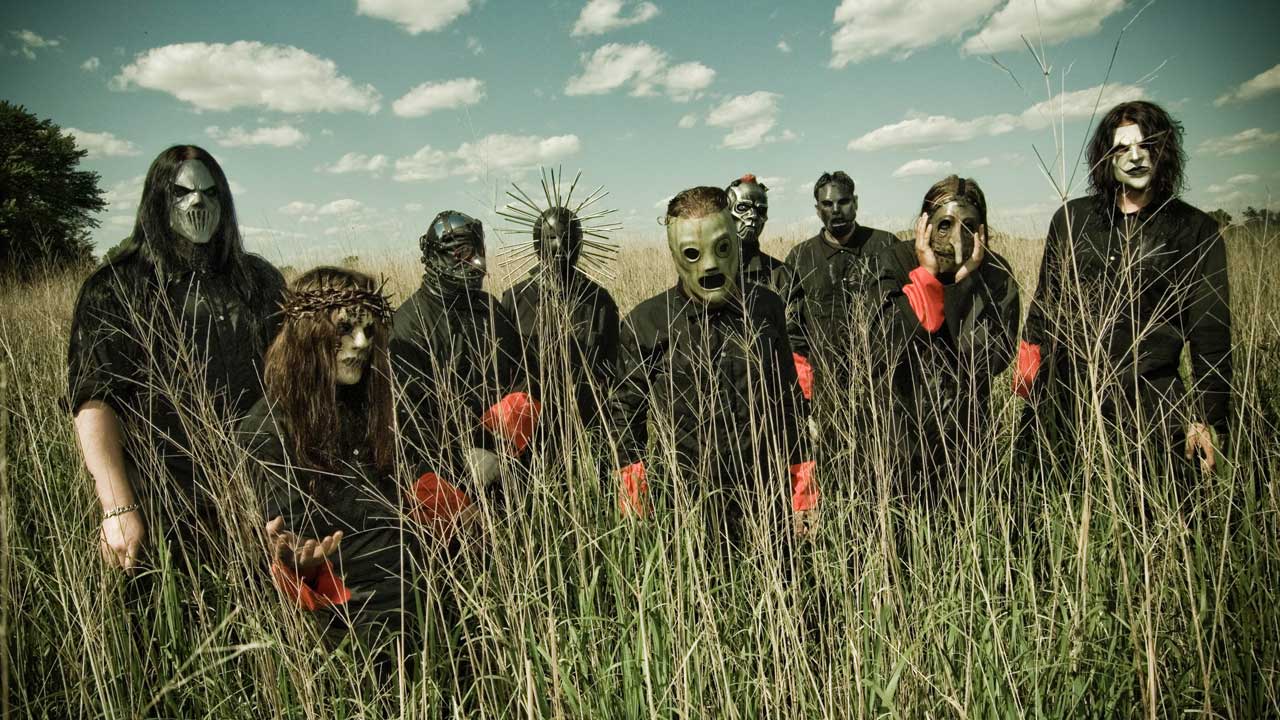Iowa, February 2008. Nine men reunited to record what would be their final album together, created under a thick, dark cloud of tension while battling personal demons. At the time, Metal Hammer reported that the dysfunction within this family was no more, and these masked menaces had found peace. In reality, things couldn’t be further from the truth.
Within five years, Slipknot would be changed forever. Bassist and founding member Paul Gray would die from an accidental overdose and drummer Joey Jordison would leave due to ongoing health issues. All Hope Is Gone is the final piece of The Nine’s legacy, the sound of a band at their most vicious, yet bound together by something much more than blood.
Before heading to Sound Farm Studio (about an hour from their hometown of Des Moines) with producer Dave Fortman, the band hadn’t spent much time together. Since finishing the Subliminal Verses tour in November 2005, Stone Sour had released Come What(ever) May in 2006, and Shawn ‘Clown’ Crahan had founded his Dirty Little Rabbits project. Paul, Joey, guitarist Jim Root and frontman Corey Taylor had been writing material for what would become the ’Knot’s fourth album, but when they gathered to start working, the cracks in the unit began to show.
“It was probably the band at its most fractious,” says Corey today, being careful not to name names. “Nobody was talking to each other, everybody was going behind everybody’s back trying to make the album theirs.
When we went into the studio there were a lot issues about what the album should be and what songs would be represented, and a certain amount of anger and bitterness because people hadn’t been given a chance to contribute as much as they would have liked to. It didn’t start on a good note and it kind of went downhill from there.”
- How to sound like Metallica's James Hetfield
- On a budget? Here are the best budget turntables
- The best budget wireless headphones: wire-free and wallet-friendly
- Spotify vs Apple Music vs Tidal: which streaming service is best for rock and metal?
At the time, real life was hitting the band hard; Clown had lost his father and Corey was going through a divorce. It was always going to be a volatile situation – and then Joey locked himself away to record alone, leaving the other bandmembers with a feeling of resentment.
“I laid down my drums and that’s where some friction started,” admits Joey today. “I knew all the songs, and I’m not slamming anyone – they’re my brothers – but not everyone knew all the songs. The whole band wrote the record, but I just decided to track on my own. When we started getting drum tones and things like that, I started doing practise takes and some of them just came out perfect and there was no reason to fuck with it.”
“It was an insult, I felt betrayal,” says Clown today, reflecting on Joey’s decision. “You don’t lock the fucking door on the Clown, OK? You just don’t. But you don’t lock the door on Joey, or Corey, or Jim, you don’t do that. I thought about blowing the handle off with my shotgun, but I thought, ‘Oh fuck, someone might get hit on the other side.’
“It wasn’t something discussed, it was what he wanted to do. He was allowed to do it, but for the record, even though he recorded the drums, they were all changed. Everything gets changed but that’s how he wanted it, that’s how he did it, and that was important to him. I look back now and try to understand it, I get it, but I wish there was more communication. We just didn’t have it.”

To add to the tensions and confusion, the members of Slipknot were working on not one, but two records at the same time. While in the main studio All Hope Is Gone was being born, Clown had commandeered studio owner Matt Sepanic’s house to record entirely different music that didn’t fit the Slipknot mould.
“While too much politics was happening in the studio, I was blowing my fucking brains out with art,” says Clown. “It was a positive thing. I had my negativity and positivity, but doing that kept me equal.”
Describing the situation as having a “Montague and Capulet” vibe, Corey says he spent his time running back and forth between the two factions of the Slipknot camp. This climate of disconnection and dissension bled into All Hope Is Gone.
“It was weird,” says Joey. “You had Shawn and Jim in one room, and I was tracking by myself with the producer. The tensions are what made that record great. Everyone was completely on fire with emotions and being in different places, and you could see the lines in the sand, you could feel the concrete breaking a little bit. “You could feel the band cracking,” he continues. “There was so much going on during that time that I think that’s what made the record so brutal. Everyone had some sort of tension to get out just to make it the heaviest record that we could.”
- Slipknot's Iowa: The making of the album that would change the face of metal
- The Stories Behind Six Classic Slipknot Songs
Clown, however, sees the divide rather differently. “At the time, people may have seen it as division, but it was really our family’s way of growing,” he says. “There are probably some cats in the band that despise that someone like myself was up recording, but if you know anything about me, I don’t give a fuck what you think. I do what I want, and that’s what needed to be done. From the outside, it’s going to look like war, because that’s how we make everything look. But on the inside, it was a nice temperature to keep the pot from overboiling.”
These hostile conditions gave All Hope Is Gone a caustic heaviness, a sound that can only come from the 18-legged killing machine of Slipknot. The brutal assault of opener Gematria (The Killing Name), the twisted discordance of Wherein Lies Continue and pummelling anthemics of This Cold Black, and the barbaric title track (which Corey wants to put back in the Slipknot setlist) make up some of Slipknot’s most underrated moments. The era-defining Psychosocial strikes at the heart of the record, alongside the arena-swelling Dead Memories. It’s a schizophrenic album, flitting from abject hatred to bombastic bounce, echoing the disunity in the studio.
The most divisive song on the record, for band and fans alike, came in the form of Snuff, the acoustic ballad Corey penned following his divorce. A departure from anything Slipknot had done before, it showcases The Great Big Mouth at his most vulnerable, pouring his heart into the music, through an emotional, introspective narrative.
“That song is the death of the old Corey and the birth of the new,” he explains. “That heavy bitterness that comes with heartache and finally letting go. There’s also such a stoic resonance with that song. It’s probably one of the most morose romantically that I have ever written, and I think that’s why it felt like a Slipknot song. A lot of people have accused me of writing it for Stone Sour then using it for Slipknot, but that was not the case whatsoever.”
- Slipknot's Mate. Feed. Kill. Repeat: the story behind the album
- The Top 20 best Corey Taylor cover versions
While Snuff was Corey’s masterpiece, just one song from Clown’s sessions, Til We Die, made it on to the special-edition release because “certain people didn’t want it on the album”. Recorded with Corey, Jim and DJ Sid Wilson, Til We Die is a tonal shift from the rest of All Hope Is Gone, nodding to the experimental sounds of their debut album while Corey’s clean vocals soar over the brooding, tidal instrumentals. While never performed live, the song has been played over the PA after every Slipknot show since its release.
Jim wrote Til We Die’s poignant opening line, ‘My friends are all hurting’, after Paul had called Clown to say he was too sick to come to the studio. Clown says it was clear Paul was struggling during the album sessions.
“There was a real fear that he wasn’t doing well,” says Clown. “I remember when I set up a photoshoot, that was a bad day. He was in a bad place, I can remember Jim and I coaching him through some stuff, and I didn’t realise until years later, but it was over then. Did I ever really think a friend was going to die? No, you just don’t put that together, because you’re young. But he was bad. He was real bad, and what he did was bad stuff. He was having a real hard time.”
After almost four months in the studio, All Hope Is Gone was released in August 2008, where it became Slipknot’s first-ever Number One album in the United States (it made it to Number Two in the UK, losing out to 90s Britpop stalwarts The Verve).
“Right before Slipknot put out an album, there’s always a bunch of people on the internet questioning the relevance,” laughs Corey. “Some critic or kid said: ‘It’s 2008 and nobody gives a shit about Slipknot anymore.’ People have been trying to call out our relevance for 20 years, so when we got that Number One, and tours sold out all over the world, it was the sweetest ‘fuck you’ to everyone.”
The album went on to reach Platinum status, selling more than one million copies in the US alone, signifying that Slipknot were as vital and important to metal as they were on their debut nine years earlier. So, in a weird way, was all the fighting worth it?
“It’s my least favourite album to make, but it’s the Number One,” chuckles the Clown. “I didn’t hold anything back and neither did anyone else. We might not have been getting along as a family, as we may have been in a bad place, but when it comes to recording and being Slipknot, we don’t hold back.
“Dave Fortman makes big albums and it was something different, so you’re goddamn right it was Number One,” adds Clown. “It better have been, we were going for that. Were we happy with each other getting there? No. But it’s not a surprise that it got to Number One because that’s what we expected.”

To spread the name of the ’Knot once more, the band embarked on an extensive world tour starting in summer 2008, which Joey describes as “absolutely fucking mayhem” all the way through. The first night of the All Hope Is Gone touring cycle was an indication of how crazy things were about to get.
“Sid broke his fucking feet the first show in Seattle,” says Corey today, still in disbelief. “He was wearing motorcycle racing boots then proceeded to jump 10ft down onto the hard deck and broke them instantly at the same time, it was fucking insane.”
But the insanity wasn’t confined to the stage, as tensions from the studio were rearing their heads once more.
“I’m not gonna throw anybody under the bus, but people’s issues started and there were some really, really fucking difficult shows, and it made that year and a half of touring almost unbearable,” sighs Corey. “There were so many fights that it was hell just getting people to catch their flights for the tour.”
The pinnacle of that tour came on June 13, 2009. Following the band’s UK arena tour in December, the British maggot contingent was growing, feeding on the rotten flesh provided by All Hope Is Gone. This meant only one thing: Slipknot were ready to make the leap so few bands do in their career. They could headline Download.
“How in the fuck did these nine guys that are playing this style of music actually land a headline set at Download? This used to be Donington!” says Joey today, seemingly still in shock. “It didn’t really register, so I had to take myself back a little bit and just think of it as another show, but as soon as we got off stage, I couldn’t believe what happened. It was a dream come true.”
For the first time in a long time, the band were nervous. Corey gave his traditional pep talk just before the show, telling the band not to let it get to them, and to just enjoy the show.
“We prepare ourselves before the show with hatred – anything in our way is going to get destroyed,” says Clown, in his typical antagonising way of speaking. “Doors shut, doors open, it’s on, get in our way and get ran over, devoured. That’s what we are, that’s what we build ourselves to be. It’s a very violent mentality still to this day.”
The set has since gone down in metal folklore as a defining moment in contemporary metal and the greatest headline performance in the festival’s history. With a 17-song setlist (including just three songs from All Hope Is Gone), Slipknot proved that they didn’t just belong with the big boys, they could blast every last band off that stage in a blaze of fire and fury.
“I just remember crying in my mask because I was so overwhelmed with it,” says Corey. “Being able to let go of all the issues that we all had, in that moment we all felt it. We looked around at each other like this is the top of the mountain and we did it together. We couldn’t have done it at the time without each other. I think we appreciated each other a bit more, at least for a little bit of time, and then it seemed like that moment was gone, but I’m glad we had it.”
Since then, Slipknot have headlined the festival two more times – in 2013 and 2015 – and are gearing up to headline for the fourth time in 2019. Somewhat crazily, that will be one more time than Metallica have topped the bill in Download’s 16-year history.
“Each time we’ve headlined Download, we’ve kicked the shit out of it,” says Clown confidently. “We’re the kings of Download because we’ve done it several times and we’ve just brought it. We know the responsibility that we’re being asked and we walk into the position correctly.”

Tragically, the dizzying highs of 2009 would be shortlived in the Slipknot saga. Less than 12 months later, Paul Gray would be found dead following a morphine overdose. Three and a half years later, Joey Jordison would leave the band he started. The Nine were no more.
“It’s not the way it was supposed to happen; we did tours, everything was rockin’ and things started getting weird and falling apart,” says Joey sombrely. “Not to get into too much business stuff, but the band’s kind of separated, it’s like two slices of bread – you have wheat, you have white, then all this shit in the middle and sometimes it just doesn’t mix.”
“I don’t have bad memories, I don’t have any regrets, I’m not mad at anyone, it’s just what a family does,” says Clown. “A family fights. A family throws punches. A family bleeds, a family doesn’t talk, a family locks doors. That’s what we are, and that was my family’s last album. Did I know it was gonna be? I did not know it was going to be with Joey, but there was a real fear with Paul. We made the tour and we were able to get out there, but by the end of it, he was so sad, there was a lot of fighting going on.
“It’s safe to say that when Slipknot takes time off, Paul was the one person worst affected by the other side-bands. It’s not that he didn’t like them – of course he did, he went and saw Stone Sour, Murderdolls – but when Paul would come home he would get really sad because all he’d want to do was Slipknot. It’s what he was born to do, it’s what he’d love to do, it’s the thing he’d love more than anything.”
And what would Paul think of Slipknot today?
“He’d love it,” says Clown. “He’d love Alex, he’d love working with Jay [Weinberg, drums], although he’d be seriously distraught about Joey. That would have broken his heart. Parting ways with Joey, that would have affected him greatly. However, Paul passing has affected Joey greatly.
“We spend a lot of time thinking about Paul. Jim and I would be writing, and we’d get close to some stuff and be like, ‘What would Paul do?’ We try to utilise that all the time. We unselfishly say, ‘Let’s play Paul Gray riffs’, or do it the way Paul would want it.”

Speaking to Joey today, despite his comments about his former band splitting in two, he still considers the Iowans his brothers and appears to hold little animosity over his departure. He still practises songs from All Hope Is Gone, declaring it his favourite Slipknot album (other than the first one). In fact, he still has a load of Slipknot demos currently going unused.
“Maybe some day they’ll surface, maybe they’ll never be heard, but I don’t translate them to any other band, they still stay in the Slipknot safe,” he says. “I won’t use ’em for anyone else besides Slipknot, if that ever happens again.”
Similarly, Clown has a load of material from his sessions in the ‘other studio’, cryptically revealing that after 10 years, the time “feels right” to release the 11 tracks he recorded during the All Hope Is Gone sessions.
“I think it [All Hope Is Gone] was us putting a darker twist on the risks that we started taking on Volume 3,” says Corey, reflecting on the album’s place in Slipknot’s story. “It could’ve been so much more. If we only listened to each other. If we’d only come together a little tighter, and I include myself. If we had only let go of some of the selfishness, it could have been incredible.”
They say you should suffer for your art, and Slipknot suffered more than most. The brothers now number seven, and while All Hope Is Gone is wrought with in-fighting and malice, their swansong remains a vital part of their lives and ours. It’s the final part of a rich, maggot-ridden tapestry: the legacy of The Nine.
Published in Metal Hammer #316